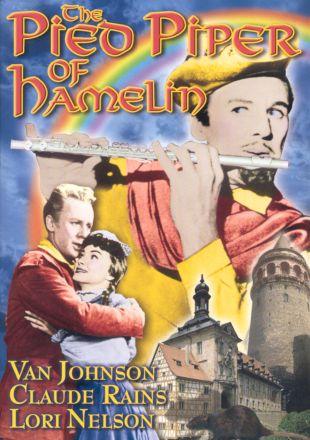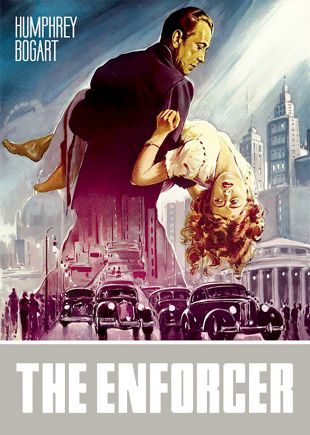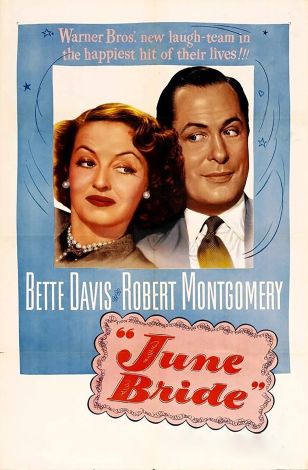From the second half of the 1930s into the mid-'40s, Bretaigne Windust was one of the most successful and celebrated directors on Broadway, acclaimed for his ability with authors as diverse as Ibsen, Chekov, Shakespeare, Robert Sherwood, Howard Lindsay, and Russel Crouse. Although his screen career was less substantial, he did direct (or, in one instance, co-direct) one of the better comedies of the late '40s and one of the most violent crime films of the early '50s.
Born Ernest Bretaigne Windust in Paris in 1906, he was the son of the English violin virtuoso Ernest Joseph Windust and the former Elizabeth Amory Day, a singer from New York City. The first language that Windust spoke was German, the language of the governess who largely raised him in early childhood -- he next learned French (which he spoke with a German accent) and then English (which he initially spoke with a French accent). His living situation wasn't much less complicated with the outbreak of World War I, as the family fled Paris to England just ahead of the Battle of the Somme. It was while living in London that Windust's interest in theater was sparked, and he spent many of the London air raids playing director with his miniature theater. He was a perennially poor student, mostly owing to his family's gypsy-like existence in England and the upheavals of the war. The family returned to Paris after the war, but the end of his parents' marriage in 1920 and his mother's decision to move to America brought Windust across the Atlantic in his mid-teens. In keeping with his mother's social standing (her father was a top surgeon and department chief at Columbia University's School of Medicine, and a distant relative of Clarence Day, of Life With Father fame), he attended private schools and lived in a relatively rarified upper-class atmosphere. He sang as a boy soprano and attended Columbia University and Princeton University. It was as a member of the Theatre Intime players at the latter institution that he first excelled, rising to their presidency. He planned to become an actor, resisting his family's hopes that he might be a career diplomat, and in 1928 co-founded the University Players of New Falmouth, MA, whose ranks included Henry Fonda, James Stewart, Margaret Sullavan, José Ferrer, Kent Smith, Myron McCormack, Mildred Natwick, and Joshua Logan. Their summer seasons of theater in the hinterlands are the stuff of legends, though Windust did almost no acting with them; rather, he found his calling as a director. By 1929, the year of his graduation, he'd joined the Theatre Guild in New York as an assistant stage manager.
In 1932, Windust directed the London production of Eugene O'Neill's Strange Interlude, and after working on a few smaller American productions, turned to acting for a time, enjoying good reviews for his performance in The Distaff Side. Then the call came from Alfred Lunt and Lynn Fontanne, who enlisted him as the director of their version of The Taming of the Shrew, which was a major success. He appeared in the stage version of Idiot's Delight, starring the Lunts, but that production closed out his career as an actor. As a director, Windust worked with the Lunts again on Amphitryon 38 (from his own translation from the French), and directed Tallulah Bankhead in The Circle. His first big hit, however, was Life With Father, the Russel Crouse/Howard Lindsay play based on the childhood remembrances of Clarence Day Jr., himself a distant relative of Windust -- the play opened in the fall of 1939 and received rave reviews, earning a long run (and, later, a Hollywood adaptation). Next up for Windust was Arsenic and Old Lace, which was even more successful and a remarkable achievement in dark comedy; Strip for Action, a comedy about burlesque, completed Windust's hat trick, giving him three simultaneous hits running on Broadway in the opening years of the 1940s. Those works also kept him busy well into the decade, preparing road company productions of the first two plays.
It wasn't long before Hollywood beckoned. Windust earned his first big-screen credit at Warner Bros. as the dialogue director in the drama Stallion Road (1947), directed by James V. Kern and starring Ronald Reagan. A year later, he helmed a pair of Bette Davis vehicles, the first an overly talky melodrama entitled Winter Meeting and the second a highly inspired romantic comedy with screwball elements, entitled June Bride. The success of the latter bore out Windust's own assessment of comedy as his true strength -- but somehow, all Warner Bros. could come up with for him to direct was dramas such as Perfect Strangers (1950) and The Enforcer (1951). Between those films, Windust did get to direct the Everett Freeman/Harry Kurnitz comedy Pretty Baby (1950), starring Betsy Drake and Edmund Gwenn. By 1952, he was working at RKO -- hardly in the best time of its history -- doing the The Bride Comes to Yellow Sky as part of the compilation film Face to Face (1952).
Windust's most enduring movies were June Bride, which is perhaps the best comedy that Bette Davis ever did, and The Enforcer. The latter, based on the prosecution of the gang known popularly as "Murder Inc.," was one of the most violent films of its era, and although Windust had sole directorial credit, it is universally agreed today that Raoul Walsh -- an old hand at crime and action films -- shared the direction with him. Windust closed out his screen career at Universal's television unit, directing episodes of Alfred Hitchcock Presents, Wagon Train, and Leave It to Beaver. He also directed The Pied Piper of Hamelin (1957), a television production starring Van Johnson that was later licensed for theatrical release by K. Gordon Murray, thus exposing it to millions of pre-teens who were too young to have seen the original broadcast. Bretaigne Windust died in 1960 in New York City.


